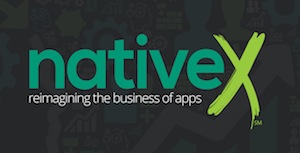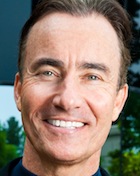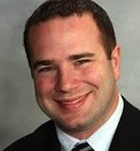 W3i, one of Minnesota’s largest and fastest-growing Internet companies, with headquarters in St. Cloud and offices in Minneapolis and San Francisco, just made a major announcement today. The company has changed its name to NativeX and completely rebranded around a new platform to help developers better monetize their apps. The focus for W3i has long been primarily (though not exclusively) on game apps, so it’s no surprise the announcement was timed to hit the wire as the company prepares for the huge Game Developers Conference, which takes place all next week in San Francisco.
W3i, one of Minnesota’s largest and fastest-growing Internet companies, with headquarters in St. Cloud and offices in Minneapolis and San Francisco, just made a major announcement today. The company has changed its name to NativeX and completely rebranded around a new platform to help developers better monetize their apps. The focus for W3i has long been primarily (though not exclusively) on game apps, so it’s no surprise the announcement was timed to hit the wire as the company prepares for the huge Game Developers Conference, which takes place all next week in San Francisco.
With this move, the company is positioning to jump on what is becoming a clear trend toward advertising that is more specific, or native, to various web platforms, as opposed to the old, tired banner advertising, which everyone loves to hate. W3i, now Native X, clearly wants to own the concept for apps, and what better way than to use the term right in their name?
A key part of the announcement today, adding mucho cred with the gaming community, is the addition of Trip Hawkins as an  “advisor to the board.” Trip, whom the company rightfully calls an “industry giant,” has a history going back to Apple’s early days. You can read all about him here on his Wikipedia page.
“advisor to the board.” Trip, whom the company rightfully calls an “industry giant,” has a history going back to Apple’s early days. You can read all about him here on his Wikipedia page.
“Native advertising is the future,” Hawkins says in the news announcement. “Every major publisher on mobile and web has their eye on native advertising right now. NativeX is proving that we as an industry can do better than banner ads.”
What many observers would find even more interesting about this new initiative of W3i (now NativeX) is that a guy named Young Sohn is chairman of its board. (More on Young below.)
I conducted an email interview with Rob Weber, cofounder and EVP of NativeX, after I got early word of this news last night:
Why did you decide to rebrand the company?
 “As we reviewed our marketing strategy, it became clear to us that the name “W3i” didn’t convey what we are all about. In the digital media world, most industry experts would agree that display advertising is broken. Even the largest banner ad units result in CPMs for publishers only in the $2.00 range, max. The reason for the low performance is display ads don’t drive engagement, and ultimately value, for marketers. This is why Google invented a more ‘native’ ad unit for its business (paid search), Facebook created new ad units built for the news feed, Twitter launched sponsored tweets, and, locally, DoApp introduced ‘RSS news ads.’ We are focused on solving this problem for consumer app developers, and we felt like the name ‘nativeX’ speaks directly to where we are headed — creating new, native ad units for developers that bring strong monetization to their business.”
“As we reviewed our marketing strategy, it became clear to us that the name “W3i” didn’t convey what we are all about. In the digital media world, most industry experts would agree that display advertising is broken. Even the largest banner ad units result in CPMs for publishers only in the $2.00 range, max. The reason for the low performance is display ads don’t drive engagement, and ultimately value, for marketers. This is why Google invented a more ‘native’ ad unit for its business (paid search), Facebook created new ad units built for the news feed, Twitter launched sponsored tweets, and, locally, DoApp introduced ‘RSS news ads.’ We are focused on solving this problem for consumer app developers, and we felt like the name ‘nativeX’ speaks directly to where we are headed — creating new, native ad units for developers that bring strong monetization to their business.”
How did you get connected to Trip? What role will he play?
“I was first introduced to Trip about a year ago by a mutual friend on a trip to San Francisco. We stayed in touch, and it became clear he could help us in a number of ways. Trip will provide a strategic perspective to our board with respect to what is going on in mobile and in the app space, which is dominated by game apps. Trip will help us build even stronger ties and awareness within the broader app world, and specifically in the Bay Area. On a personal level, Trip has also been helpful as a mentor to me.”
How long have you been planning this? Who drove the rebranding?
“Plans have been in the works for a few months, and the rebranding effort has been led by our new VP of Marketing, Diana LaGattuta,  based in San Francisco.” [Ed.: Her photo at right, and her bio appears on the NatixeX web site.]
based in San Francisco.” [Ed.: Her photo at right, and her bio appears on the NatixeX web site.]
What changes will result to the organization locally, if any?
“In terms of local changes, we expect a clearer message to our target clients, along with the new technology we are launching, will enable us to continue to increase the value of our company, which will result in us ontinuing to hire even more folks locally.”
How will this affect your SF organization? Will you be expanding it?
“We are looking to grow additional headcount in all three of our offices — Sartell, Minneapolis, and San Francisco. The Bay Area has a lot of relevant talent for a business like ours, and we plan to add significant headcount there. We’ve seen that the Bay Area talent we already have gives us the opportunity to increase our perspective, which helps the rest of the team grow faster.”
Does it mean any significant new hiring plans right away?
“We have lots of hiring plans immediately. Check out our career page for specifics.” [Ed.: That would be here. No specific jobs listed there yet, but there sure is some enticing copy. And an email link to apply.]
What new partnerships, if any, will become a part of this new initiative?
“We will continue to ramp partnerships with mobile and desktop app developers. For example, in October we announced a new partnership with one of the globally most popular mobile app developers in the world, Imangi Studios, maker of the smash hit Temple Run. We have some other new partnerships that will be similar, but taking advantage of our new native technology.”
What are the long-term implications in this for your company?
“We think the rebranding and new technology will help us create further differentiation in the market. We think we can own ‘native advertising’ within the app space. Expect to see more specifics in terms of new products, technology, partnerships, and more tied to this ‘native’ approach.”
What if anything can we read into this because you have the Chief Strategy Officer of Samsung on your board?
“Young was 100% supportive of our rebranding.”
Rob Weber and his company have long been champions of developers, not only helping them make money with their apps, but even helping them get funding to launch or expand. He wrote a guest post on VentureBeat earlier this month, Six ways the Five Horsemen of Tech can build better app ecosystems, in which he spoke about that. (The “Five Horseman” being Amazon, Apple, Facebook, Google, and Samsung.)
#3 Lend a Hand: Create Funding Programs for Developers
This one is also fairly obvious. On one hand, you have large thriving companies generating billions of dollars in revenue every year. On the other hand, you have an app market that gets more cutthroat every day and is filled with bootstrapped developers struggling to stay competitive. All of the horsemen should be creating sizable developer funds to help them build the teams and infrastructure they need to make great apps. Such funds would also encourage developers to leverage the horsemen’s technology and make something innovative on their platform. Samsung is a great example of this. With their recently announced $100 million Samsung Catalyst Fund, Samsung will expand their brand, work with great developers, and help build their app ecosystem as clarified at the recent Dive Into Media conference.
Horseman that does this the best: Samsung*
*Full disclosure, the Chairman of our board at nativeX, Young Sohn, is President and Chief Strategy Officer at Samsung, and is involved in overseeing Samsung’s fund.
Young Sohn will surely play a role in guiding NativeX to even more growth going forward. Stay tuned!
By the way, I will be reporting from GDC next week myself, including updates about Minneapolis-based startup Canopy, which also will have a presence there.
——-
(My disclosure: I provided consulting services to W3i in past years, but have no current contractual relationship with the firm.)